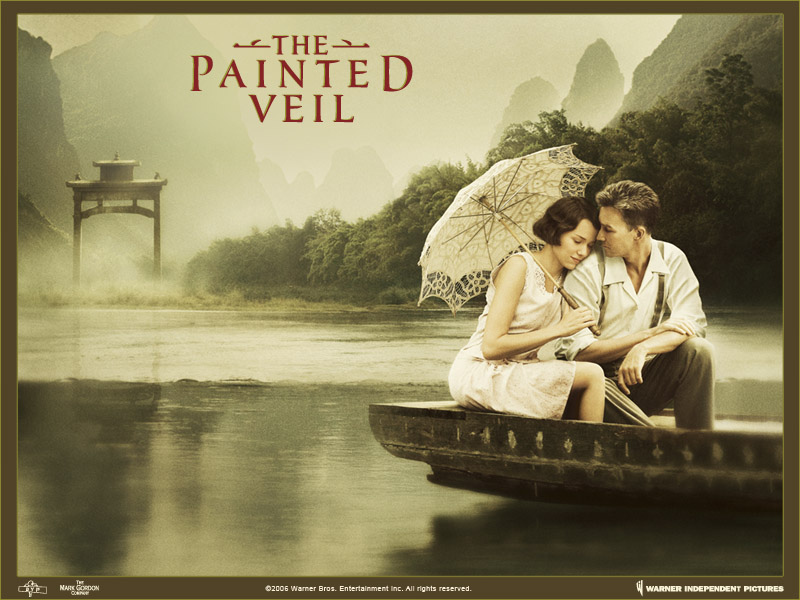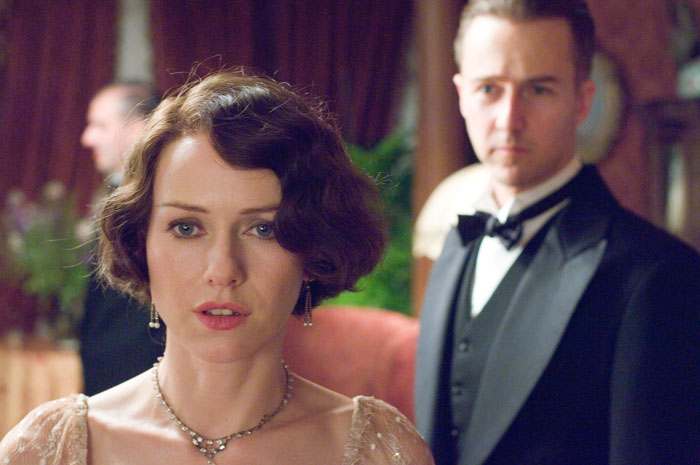I first saw this film a few months after its release. It came up as a recommendation on Netflix, probably because I'd displayed a passion for historical pieces. What arrived on the disc was an historical piece with far more passion than I'd expected and it's a film that has sat with me ever since. It's one of those that I have to avoid when looking for something to watch for a few minutes over a meal because I know I'll sit there to the end. Sometimes I do, anyway.
I've never read the Somerset Maughm novel that it's based upon nor have I seen the two earlier film adaptations. I suppose that engaging any of those might be interesting, simply to see how other actors and writers have approached it. But I have such an identification with the 2006 version that I feel certain that I'd be disappointed with any other depiction at this point.
First and foremost, it's the performance of the two leads, Naomi Watts and Edward Norton, that makes the film go. As it is essentially focused on the peaks and valleys of their relationship (and like the surrounding karst, there are many), that seems only natural. But both of them carry the film with such intensity that it seems to border on a recorded play. Everything in the film smolders when they're on the screen, whether with anguish or lust, heartache or fear. Norton, as the austere and emotionally stunted Walter Fane, creates an image so distant and spiteful that it's difficult to actually sympathize with his reaction to being cuckolded. When the revelation is made some distance into the story that he's actually fond of children and chooses to spend most of his time caring for them, the audience is every bit as surprised as his then-estranged wife.
Watts, as Kitty, displays her own dichotomy, as well, given that her character is far more emotionally and sexually experienced than her husband, but perhaps just as easily adrift in her own fantasy world about the way things "ought to be." Having been the life of her own little social circle in London, she enters the circle of the real world when she takes up with her lover (Liev Schreiber) and believes that this far more suitable man will disrupt his own life to perfect hers. This time it's Walter's turn to be the more experienced one as he laughs at her disillusionment before the two of them proceed into the hinterlands of China.
It's that setting which plays the third role in the film, as the foreign culture, the sub-tropical location, and the stark class and racial struggles and differences create the crucible that expands the story beyond that of yet another infidelity tale. Walter's delicate dance between age-old spiritual customs, the realities of the then-still-recent science of bacteriology, and the nationalist politics amidst competing warlords create a story that would be interesting to follow as a documentary but which is presented here with the greater urgency generated by his personal conflict. By the same token, Kitty is also forced to come face-to-face, quite literally, with both "the other half" and the conditions they inhabit, often based on class, but in this case also starkly tied to race (in true British Imperial fashion.) Her submergence of the playgirl lifestyle, so obvious to everyone around her, in order to work in an orphanage run by nuns, is a demonstration of a personal transformation. Her doing so even as Walter reminds her that the inherent religious imperialism practiced by those nuns (and their mother superior, played by Diana Rigg, currently of Game of Thrones' Olenna Redwyne fame) is at least partially responsible for the resistance of the local population to their very presence is a demonstration of just how fine the lines can be when trying to compress one's personal philosophies into the shapes requested or even needed by society. This in itself is a replication of the struggle that the two leads have: how to get their disparate personalities and worldviews to function for the betterment of both of them. As Rigg states to Kitty at one point: "When you have duty and passion, then you have grace within you."
There's a certain languid intensity that permeates the film's every corner, even when Watts and Norton aren't the focus. The touches on various historical elements - the opium culture and its notorious British past; the ferocity of and terror created by a disease like cholera; the implacability of the warlords in the face of a "Nationalist" rule that is best defined as "only within the eyesight of the ruler" - all create a texture rich enough to generate 2 or three films, but which is properly contained here to give as complete a story as possible and let the audience pursue it afterward in their own thoughts as they may. The film stays with you because of that texture and the infused passion. What encourages that is the phenomenally moody and ethereal score composed by Alexandre Desplat:
That simple 5-note phrase has so much depth that it's almost an emotional appeal unto itself. One could get lost in the story hidden behind that music even without having seen the film. There aren't many soundtracks that I listen to without the movie playing. This is one of them.
Of course, it has to be said here that the class struggles and the history are perhaps more poignant to me than most. Societal transformation and the emergence into a new cultural paradigm both within and without China during the period that the film is set is the "writ large", as it were, of the two leads' personal anguish. But what also comes to my mind is that I first saw this film while going through a period in my own marriage that was very similar. My (now) ex-wife and I were on very different pages in the manual of life and of mindsets that were quite similar to Walter and Kitty, respectively. I remember when the credits first started rolling and both of us were silent for quite some time, digesting not only what we'd seen but how emblematic it was of what we were living at that time. One would think that that's another reason, perhaps the primary one, of why the film has stuck with me over the years. But I never think about that time when I see it these days, as the film stands on its own as a rather under-appreciated production of a remarkable story about life, death, and the emotional path that ties them together.





I'll be honest: I tend not to watch films this deep. I've been biased towards comedies and documentaries for well over a decade. Sounds like this one is a doozy.
ReplyDeleteHuh. Yeah, we're coming from diametrically-opposed perspectives on that one. All I want these days is something that will make me think. Saw World War Z yesterday and it was horrible precisely because they'd abandoned everything that was original about the novel in favor of bland, predictable, and clichéd.
ReplyDelete